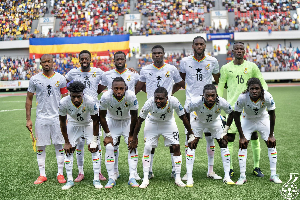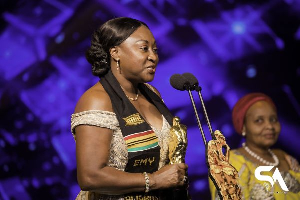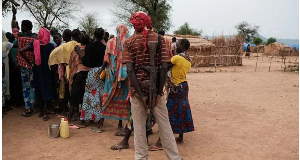General News of Tuesday, 23 June 2020
Source: classfmonline.com
Free-to-air TV access: Supreme Court dismisses GIBA case against NCA
Ghana’s Supreme Court has dismissed a case filed by the Ghana Independent Broadcasters Association (GIBA) against the National Communication Authority (NCA) and the Attorney General concerning the decision by the regulator to give conditional access to its free-to-air TV space.
The seven-member panel of justices presided over by Chief Justice Anin Yeboah unanimously dismissed the case in a decision read by Justice Sule Gbadegbe.
The Bench, which also had Justices Jones Dotse, Samuel Marfu-Sau, Prof Nii Ashis Kotey and Nene Amegertchar, said the applicants did not properly invoke the original jurisdiction of the apex court.
GIBA filed the suit on 28 January 2020, arguing that the NCA's decision to introduce conditional access to free-to-air TV broadcast was aa breach of the right to free press as enshrined in the 1992 Constitution.
In its writ, GIBA sought a number of reliefs including that the Conditional Access (CA) System introduced as a mandatory requirement by the NCA by which media content of free-to-air broadcasters are blocked by the government unless certain criteria have been met, constitutes an unnecessary restraint on the establishment and operation of private media as enshrined in Article 162(3) of the 1992 Constitution.
It also sought a declaration that the blockage of media content of free-to-air broadcasters through the use of the Conditional Access System introduced by the NCA is unconstitutional as same constitutes an unreasonable and unnecessary abridgement of the freedom of the media contained in Article 21(a) and 162 (1) of the 1992 Constitution.
Another relief sought was a declaration that the blockage of media content of free-to-air broadcasters through the use of the Conditional Access System introduced by the NCA, contravenes the spirit and letter of Article 21(f) of the 1992 Constitution since same constitutes an unnecessary abridgement of the right to information guaranteed under the Constitution.
GIBA also sought an order directed at the NCA to remove from the Minimum Requirements for Reception of Digital Terrestrial and Satellite Television Services, any system in the nature of Conditional Access that encrypts or blocks the content of Free-To-Air television channels from being received.
The Ministry of Communication, through its agency, the NCA, since 2017, have been attempting to implement dramatic changes to the television broadcast sector with the introduction of systems of control (Conditional Access System – CAS) which GIBA frowned upon, due to its ability to lockdown the liberalised airwaves and send the nation back to the dark days of monopolised and controlled media.
Prior to going to court, GIBA accused the Ministry of Communication (MoC) of doctoring the standards document prepared by the Ghana Standards Authority (GSA) regarding Digital Terrestrial Television (DTT) and Direct-To-Home (DTH) Receivers, and, in the process, smuggled in conditions which make access to the country’s “only free-to-air digital broadcasting facility” conditional.
In GIBA’s view, the doctored document makes nonsense of the GSA’s recently-revised standard (GS1099: 2019) on Digital Terrestrial Television (DTT) and Direct-To-Home (DTH) Receivers, which made Conditional Access System (CAS) non-mandatory for Free-To-Air TV Receivers, a development that the association welcomed on 18 December 2019.
“In a dramatic fashion”, however, GIBA said in a statement issued on Wednesday, 8 January 2020 and signed by its President, Mr Andrew Danso-Aninkora that “the MoC, working together with Mr Andy Townend – representing Inview Technologies, assisted by Mr Oluwatoyin Subair – founder of the erstwhile Hi-TV Pay Network in Nigeria and ILC Consulting Ltd, has come out with an alarming publication which is a doctored version of the Ghana Standards Authority’s newly-gazetted and published Technical Standard of August 2019 as the Ghana Minimum Technical Specifications for Digital Terrestrial Television (DTT) & Direct-to-Home (DTH) Receivers for Free-to-Air Television Reception”.
According to GIBA, the doctored document, which was published on 30 December 2019, by the National Communication Authority (NCA) on their official website as a technical standard, “requires the broadcast industry in Ghana and all Ghanaian households to abide by its mandatory requirements for the reception of all TV programmes carried on the nation’s only free-to-air digital broadcasting facility”.
The requirements, GIBA noted, “include the acquisition of a special decoder with a proprietary software before anyone could watch any Free-to-Air television programme in Ghana”.
The special decoder, it said, “shall be controlled by Conditional Access software and Middleware applications to be provided by a foreign company called VERIMATRIX, solely selected by the MoC as their partner. By default, Verimatrix, who have also been awarded the business of broadcasting value-added services, shall perpetually provide updates to the platform because by virtue of the proprietary software introduced”, adding: “No other entity can perform updates to the platform”, a situation GIBA said “raises serious issues of unfair competition”.
GIBA said the MoC’s private partners “have also been given the mandate to trade in broadcasting services, without authorisation by the NCA as required”.
The association has urged “all well-meaning Ghanaians and leaders from the political divide to question what is going on”, charging: “Let us defend our constitutional right to FTA media platforms and safeguard our media space from sinister ownership and the negative machinations of the MoC”.
“GIBA is prepared to lead this fight to its logical conclusion”, the group warned.












